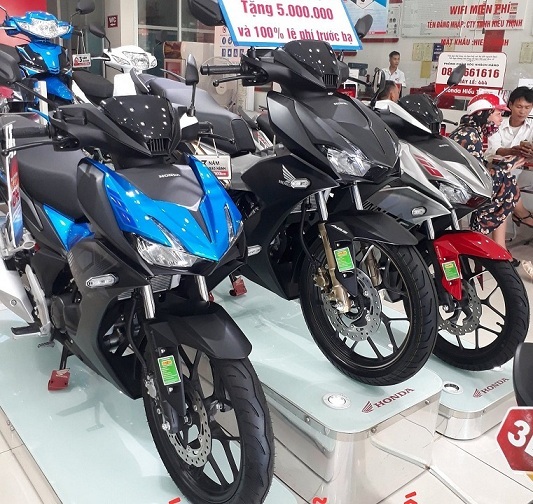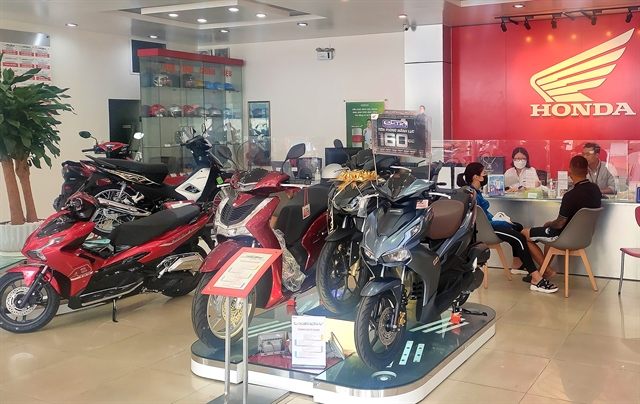 Economy
Economy

 |
| A Honda's motorbike shop at Nguyễn Khang Street in Hà Nội. VNS Photo Đoàn Tùng |
HÀ NỘI — Domestic motorcycle industry has been experiencing a shift towards the "niche" market in recent years. Traditional market segments have been narrowing and Vietnamese motorcycle manufacturers are adapting their strategies to cater to the changing demands of consumers, according to industry insiders.
They said that this shift was driven by several factors, including a decline in market demand and a need for innovation and differentiation.
According to a report by the Việt Nam Association of Motorcycle Manufacturers (VAMM), motorcycle sales have been declining over the past five years for major brands such as Honda, Piaggio, Suzuki, SYM and Yamaha. The motorcycle sales in 2019 were 3.25 million units, which decreased to 2.71 million units in 2020 and further dropped to 2.49 million units in 2021 due to the impact of the COVID-19 pandemic. While demand for cars is increasing, motorcycle sales are projected to decrease to 2.51 million units in 2023, indicating a cyclical and saturated market.
The local market has a high demand for motorcycles as a primary mode of transportation, but traditional gasoline-powered motorcycles are facing challenges. These motorcycles receive limited investment in improvements and design changes, leading to a lack of excitement among consumers. Motorcycles are predominantly used by middle- to low-income workers and students in big cities, with peak sales occurring from late August to December each year.
To address these challenges, motorcycle manufacturers are adopting new strategies. There are three prominent trends in the domestic motorcycle industry. Firstly, there is a gradual shift towards environment friendly vehicles, particularly electric motorcycles, which is encouraged by the Government.
VinFast, a prominent domestic manufacturer, is leading the way in producing electric motorcycles, along with other brands such as Yadea, Pega and Đạt Bike. The sale of electric motorcycles in Việt Nam has been growing at a rate of 30-35 per cent in recent years, and the country is expected to have nearly 75 million motorcycles by the end of 2023, including 2.3 million electric motorcycles.
Secondly, motorcycle manufacturers are aiming to turn Việt Nam into a large-scale manufacturing centre for motorcycles, with a focus on exporting complete vehicles, components and spare parts. Honda Vietnam (HVN) has been successful in exporting vehicles and spare parts, with Yamaha Motor Việt Nam also expanding its export activities.
Lastly, Vietnamese motorcycle manufacturers are targeting the "niche" market, which includes unique, unusual and rare motorcycle products. Some large car companies have started bringing these models to Việt Nam, and HVN has recognised the potential of such products. The Honda SH scooter product line has been successful in the high-end market segment, and imported scooter models like Honda Vario 150 and Honda Cross Cub 110 have gained popularity among young customers. Suzuki Vietnam and Yamaha Vietnam have also introduced models to compete with imported counterparts.
Moreover, manufacturers are focusing on large displacement vehicles to cater to the growing high-end customer base. These motorcycles are popular among car owners who enjoy cross-country trips and young individuals looking to express their personality. HVN, Piaggio and Yamaha have established dedicated dealerships for large displacement vehicles, offering maintenance and repair services.
The shift towards the "niche" market allows businesses to minimise risks associated with the traditional gasoline car market and explore new opportunities in Việt Nam. However, this trend also puts pressure on imported car dealers who have traditionally dominated the market. — VNS